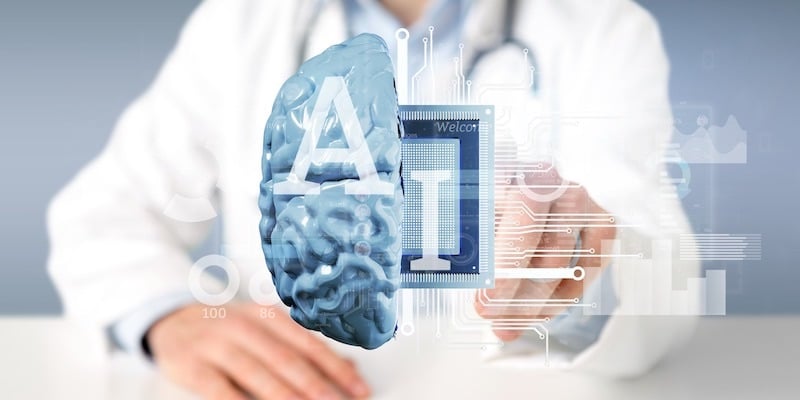
According to HealthCareITNews.com, the summer of 2023 saw a “feverish launch” of artificial intelligence (AI) tools by major players in the health technology sector. A notable inclusion among these tools are generative AI applications, designed to automatically generate text, images, and more. Generation occurs as the technology “learns” structures and patterns from the data it is fed, allowing it to create similar outputs.
The article highlights that these technological strides have the potential to significantly enhance electronic health record (EHR) systems. The integration of generative AI with EHR systems could be transformative for healthcare, offering solutions to critical issues and reshaping our current understanding of healthcare management.
Below, we explore some of the latest advancements in AI-driven healthcare technology.
Microsoft-Epic Collaboration
In August 2023, Microsoft revealed an expansion of their healthcare AI initiative by integrating technologies—including generative ones—throughout Epic EHR systems. Through this collaboration, healthcare organizations will be able to gain access to generated AI insights and administrative tools that can help boost operational efficiency and support the financial integrity of health-related systems while also improving the patient experience.
More specifically, dozens of copilot solutions are in process to address challenges faced by healthcare systems in finance, staffing, and clinical access. They include the following:
- AI-assisted Epic in Basket, which focuses on improving clinical efficiency for medical professionals through faster documentation of notes through suggested text and in-context summaries that can be rapidly reviewed
- Medical coding suggestions, which are generated through AI to drive efficiencies in revenue cycle management and are based on already-existing clinical documentation to maintain accuracy in streamlined ways
- Azure OpenAI Service to leverage generative AI to fill in gaps using real-world data with a focus on advancing medicine for better patient outcomes; this technology can also be used to study rare diseases and, ideally, spur on treatments
Generative AI will also help medical professionals using the Epic EHR platform to reduce their MyChart inbox. After receiving a message from a patient, AI will write a draft response for the physician to review, edit as needed, and send. The human being will stay in control of messaging, but with benefits including a streamlined workflow and enhanced productivity. These generative AI tools are “run in a HIPAA-compliant-environment so patient data stay protected.”
Oracle Cerner Initiatives
Oracle, meanwhile, is using generative AI to update the Cerner EHR. Rather than Oracle writing new code for Cerner’s modernized version of its EHR system, through the power of AI, they’re using an application generator dubbed Apex. Code is being written one piece at a time rather than a big redo all at once with the process involving moving all clients to the cloud to improve performance and security. Once that’s accomplished, new features will show up in the revamped EHR application. Benefits of Apex include efficiency and enhanced accuracy.
Oracle’s Clinical Digital Assistant technology will allow healthcare providers to use generative AI through voice commands to reduce the burden of documentation and allow them to give patients their full attention. Note-taking is automated in this multimodal tool, and the AI can recommend the next actions, which can include follow-up appointments, lab scheduling, and prescription ordering.
Oracle Cerner is collaborating with John Snow Labs and the U.S. Food and Drug Administration’s (FDA) Sentinel Initiative which is aimed at improving drug safety. AI extracts key information from clinical notes found in the Cerner EHR (which can come through generative AI) to help the FDA understand the impact of certain medications on large populations.
This two-year project will focus on how technology associated with machine learning and natural language processing may help to fill in knowledge gaps. Cerner and John Snow Labs plan to enhance phenotyping—meaning, computerized queries—of digital patient data and associated notes to support pharmacoepidemiology; this is a study of real-life benefits and risks of using drugs to treat people’s medical conditions.
eClinicalWorks Announcements
This ambulatory cloud EHR system recently committed $100 million to Microsoft Azure to gain access to the power of the Microsoft cloud and is integrating its EHR solution with ChatGPT. They’ll use Azure OpenAI Service to advance their offerings to healthcare organizations. Practically speaking, users can ask the EHR questions in conversational language to gather relevant information about the patient. Then, the document management portion of eClinicalWorks will identify and assign documents and appropriately route them—all as automated functions. The EHR copilot will have the capacity to summarize interactions, which will ease the burden of physicians and streamline administrative requirements.
Carbon Health’s Hands-Free Charting
Although hands-free charting would have seemed a fantasy not that long ago, Carbon Health has debuted this technology using GPT-4 AI in their EHR system. With patient consent, the medical provider can record conversations in the EHR that will be transcribed through Amazon Web Services and combined with additional patient data. This can include lab results and demographics. Visit summaries are then automatically generated and completed by the physician.
Benefits of this system, Carbon Health notes, include efficiency with a medical chart completed in less than 4 minutes; compared to a manually created chart, which saves 12 minutes apiece. It’s also accurate: 88 percent of the text generated by AI is accepted without edits from the medical provider. Plus, charts are 2.5 times more detailed than the manual entries.
Implementing Tomorrow’s Technology Today
To harness the groundbreaking potential of generative AI for your healthcare organization, selecting the right EHR consulting firm is essential. HealthTECH Resources stands out in this regard. Our extensive network of EHR consultants includes experts specializing in the integration and optimization of AI-EHR technologies, ensuring your organization is at the forefront of this revolutionary advancement.
As a boutique agency, we are uniquely positioned to address your staffing needs with consultants who are always in sync with the latest technological trends, including the cutting-edge generative AI developments discussed in this article. For personalized solutions tailored to your specific needs, we invite you to contact HealthTECH Resources. Connect with us online or reach out directly at (602) 903-7961 to start a conversation about transforming your healthcare services with the technology of tomorrow.

PRESIDENT/CEO AT HEALTHTECH RESOURCES
Larry has specialized in building strategic healthcare relationships for over 25 years, helping the nation’s top payors and providers solve some of their most pressing business challenges through an intelligent mix of staffing services, training, and consulting.
